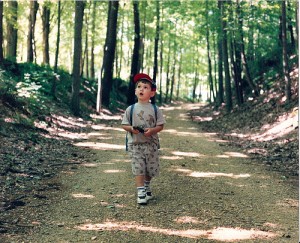 God, I hated camp.
God, I hated camp.
No, that’s not really true. I didn’t hate all camps – I loved the bare bones country day camp I grew up at (where the only “facilities” were a lovely lakefront, a dusty/muddy field and a falling down barn), and some of my all-time best memories are from my teen years as a sleepaway camp counselor.
I just hated the fancy camp my parents inexplicably sent me to the summer I turned 11. I was a bookish, slightly awkward tween stuck in a cabin full of queen bees and wannebes. To say I didn’t fit it would be a significant understatement. One of the counselors made fun of my clothes. (Apparently shopping at Miracle Mart didn’t put me on the fashion radar.) I somehow got stuck stacking the plates at every single mealtime, and was so socially marginal I didn’t realize until years later the kind of social collusion this must have involved.
But I digress.
This was a different era, before it was possible to research camps online, before the very concept of camp consultants crossed our minds. We had grown up chewing on our lead-painted crib bars, bicycling without helmets and sitting on our dad’s lap in the driver’s seat, so what did we know?
That one negative experience certainly didn’t stop me from wanting to send my own three girls to summer camp. Our older two have loved their few weeks each summer at sleepaway camp, and our youngest is experiencing it for the very first time. It’s been very clear to us that their weeks in a lakeside cabin full of kids have been great for them in all kinds of ways. It turns out that they have been wonderful for us parents stuck at home too. Here, in no particular order, are some of these benefits:
Your kids grow up. Not just literally (although the evidence suggests that kids tend to grow faster in the summertime), but in terms of their independence and maturity. The camp dynamic forces kids to organize their own stuff, choose what they will wear, eat and what activities to add to their schedules. Some camps let the campers decide when (or if) they will shower, write letters home or wear their sun hats. The increased autonomy teaches kids consequences for their actions — consequences many of today’s parents never let their kids experience for themselves.
You didn’t wear sunscreen? Ouch, that sunburn is going to really hurt. You didn’t brush your teeth for a solid week? Your friends and bunkmates may avoid spending time with you because your breath stinks and your teeth are full of yellow gunk. You didn’t wipe your feet off before you got into bed? You’ll spend a night in a sleeping bag full of sand.
We can lecture till we are red in the face, but there is no better lesson than the consequences of our own actions, a philosophy of self-reliance beautifully explained in Wendy Mogel’s book, Blessing of a Skinned Knee.
Your kids relax. It isn’t just the lack of homework that counts. It’s the absence of televisions, computers, DS games, iPods and cellphones. They are spending loads of time outdoors, and plenty of time doing physical activities. Isn’t this what we plead with them to do every day? And yet at home it’s an uphill battle and constant source of tension and conflict. In camp there is no choice, and parents are removed from the equation.
There are no hectic schedules, doctor’s appointments, frantic carpools to soccer games, and overcrowded family commitments. The camp takes care of making sure everyone gets where they need to be. There is even scheduled quiet time, and hanging out by the lake/ pool time. Staring at clouds time.
Try and remember this if you haven’t gotten a letter or email, or you don’t see them doing anything in the pictures posted on the camp website. All of this relaxing time doesn’t jive so well with the technological surveillance camps now offer. It’s tempting to spend hours hitting the “refresh” button on the website in the hopes of getting a glimpse of your kid, but this can also make you crazy. (I’m so glad our daughters’ camp doesn’t post pictures — I would be in total stalker mode.)
Your kids spend time with kids of all ages. Especially their counselors. And for some reason these 18 and 19-year-olds are able to get your kids to do magical things, such as making their beds or stacking their dishes without being reminded. New York Times blogger Michael Thompson says this is because kids are wired to emulate and closely observe older children. The influence of these high school and college-aged kids (who are also way cooler and better looking than us relatively ancient parents) is their due for hanging out with younger kids. After all, as Thompson points out, “In our age-segregated society, camp is the only place in America where an 11-year-old can get the sustained attention of a 19-year-old.”
Without all the complicated emotional connections of a parent-child relationship, these enthusiastic but inexperienced teens tend to be much more successful at encouraging our kids to ride horses, windsurf, water ski or eat vegetables.
Parents get some perspective. Taking a bit of a break from the day-to-day dynamics of parenting is refreshing for everyone. If younger siblings are still at home you can give them some rare “only child” time. Our youngest daughter absolutely loved this in past summers, though she also missed having her sisters around. And if you become temporary empty nesters you can find some time for yourself or your spouse. My husband and I are enjoying two weeks together for the first time in 13 years, and we’ve really enjoyed being able to spontaneously hop on our bikes after work, or head out for an impromptu movie. It’s easier to talk about things other than our children, and the brief reprieve from making lunches, doing laundry and cleaning up has meant a lot more free time.
The challenge is to hold on to all of these things when the kids come home. It’s easy to slip back into old habits. Remember that your kids now know how to sweep, stack their dishes, make their beds and organize their own clothes (more or less). Build on this independence by incorporating it into their daily routine. They have spent hours outside without being “too tired” to do anything but play on an iPad or Xbox.
Set your expectations high. Don’t give in to old ways just because it’s easier that way. You may need to re-sweep an hour after your eight-your-old empties the dustpan, but taking the broom for a spin is the only way she will learn good technique. Let them show you what they can do. You may have to be patient, but you won’t be disappointed.
And maybe, just maybe if we can hold on to some of the lessons learned from camp, we can hold on to a little bit of summer all year long.



